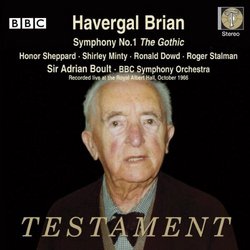A Legendary Performance of Brian's "Gothic" Symphony
Thomas F. Bertonneau | Oswego, NY United States | 02/17/2010
(4 out of 5 stars)
"Devotees of the English music-phenomenon Havergal Brian still await a convincing recorded version of the remarkable or notorious "Gothic" Symphony, written between 1919 and 1927 and first performed, by amateur forces, in 1961. Sir Adrian Boult led the first professional performance in a BBC broadcast in 1966. Perverse BBC policies did one of two things, between which insufficient information makes it difficult to decide. Either the BBC did not professionally record the performance, but subsequently made legal claims on someone's "air-check" recording; or they recorded it, with noticeable inadequacy, and sat on the tape for four decades. The appearance of Boult's performance on the American Aries label, in a pirated, "gatefold" double-LP, in the early 1970s, suggests the former; but the issuance of this same performance as a two-CD set by Testament suggests the latter. In the meantime, of course, the enterprising Marco Polo label produced a recording, with Slovak forces, that the label issued in 1989. At the time, this Bratislava "Gothic" was the only available recorded representation of Brian's Titanic score.
It must be said, however, that the Marco Polo "Gothic," as welcome as it was, suffered from congested, murky sound. Despite the even more severe acoustic limitations of the Aries LPs (whose source must have been an open-reel tape recorded with heavy, irreversible dynamic filtering), it remained clear that Boult's performance, if not the sound of his recording, was better than Lenart's performance, as brave as the latter's was.
Does the Testament CD-set of Boult's "Gothic" use the same source as the old Aries LPs? Because the Testament booklet gives precisely no information about the archival basis of the reissue, listeners can only guess. Sonically, the Testament discs are restricted, suggesting a quarter-inch open-reel source; but the Testament discs definitely sound better than the Aries LPs. The dynamic range is greater (the highs and lows have not been adjusted to the same homogeneous level), as are the stereo spread and the audibility of instrumental detail. Nevertheless, the same cavernous resonance that muddies the sound of the Aries LPs is detectable in the Testament CDs, with the result that tutti passages blur into indecipherability at times. The Testament CDS are not the disaster that reviewer David Hurwitz dismissively claims them as being at his "Classics Today" website, but they remain far from ideal.
Nevertheless, Brian's massive symphony, its second part an immense setting of the Te Deum, wants as much representation as it can get, which, for the foreseeable future means this 1966 recording and Lenart's 1989 Bratislava foray. The excitement of the 1966 occasion is better captured here than it was in the Aries LPs. The booklet is nicely produced, but it ought to have addressed the issues concerning sources, to which I have alluded above. By contrast, the booklet accompanying Testament's reissue of Boult's 1947 broadcast of Mahler's Third Symphony gives detailed information about sources. So why then the absence of similar information in the case of Brian, one could ask?
"


 Track Listings (4) - Disc #1
Track Listings (4) - Disc #1